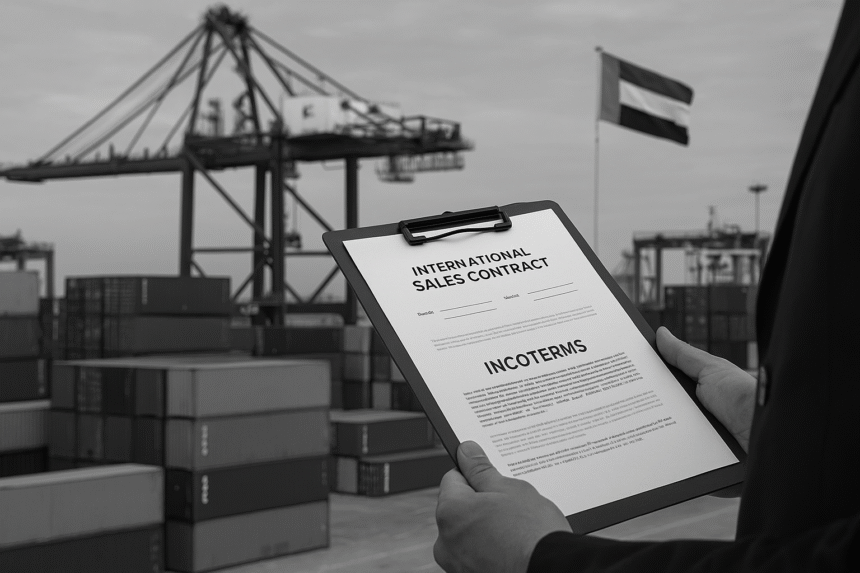What Is an Incoterm?
Incoterm Definition and Examples
Explained: International Shipping Terms for Contracts and Trade
Quick Answer
An Incoterm (short for International Commercial Term) is a standardized trade term used in contracts to clearly define which party is responsible for the cost, risk, and logistics of transporting goods in international or cross-border sales. They help avoid confusion about who does what—from shipping and insurance to customs and delivery.
Breaking Down the Definition
They are published by the International Chamber of Commerce (ICC) and are widely used in global sales contracts. Each specifies:
- Who arranges shipping and insurance
- Where risk transfers from seller to buyer
- Who pays duties and clears customs
- The delivery point and responsibilities
They are made up of three-letter codes like FOB, CIF, or DAP. For example:
- FOB (Free on Board): Seller delivers goods to port, buyer takes it from there.
- CIF (Cost, Insurance, and Freight): Seller covers transport and insurance to destination.
- EXW (Ex Works): Buyer takes goods from seller’s location and handles everything.
They are not the full sales contract—they only cover the delivery terms. Payment terms, warranties, and dispute resolution are handled elsewhere.
Why Incoterms Matter in Business Contracts
If you’re buying or selling goods internationally, they are your blueprint for “who does what, when, and at whose cost.” Without them, trade contracts can quickly fall into confusion and disputes.
Here’s why they’re essential for CEOs, founders, and trade consultants:
1. Clear Risk Transfer
They define the point where the risk of loss or damage to the goods shifts from seller to buyer. This avoids costly misunderstandings about liability during transit.
2. Cost Allocation
They specify which party pays for transport, insurance, export duties, and unloading. That helps you price your product accurately—and protect your margin.
3. Customs and Logistics Clarity
For companies trading in complex markets like the EU, Africa, or the Gulf, customs clearance delays can be expensive. They clarify which party handles documentation, import/export compliance, and port delivery.
4. Negotiation Simplicity
Instead of spelling out delivery responsibilities from scratch in every contract, parties simply agree on one Incoterm. This reduces contract length, speeds negotiation, and standardizes deals.
Legal and Practical Implications
While Incoterms are not laws, they are legally binding if referenced in the contract. Here’s how they impact contract drafting and negotiation:
1. Contract Drafting
- You must specify the correct version (e.g., “FOB Shanghai, Incoterms 2020”).
- The term must align with the mode of transport:
- FOB is for sea freight.
- DDP or DAP work for any mode.
-
If not used correctly, the clause can become invalid or disputed.
2. Risk Allocation
A misunderstanding about Incoterms could mean one party mistakenly believes they are covered by insurance or not responsible for customs fees. This can lead to costly claims, especially if goods are damaged in transit.
3. Jurisdictional Sensitivities
- In Gulf countries, customs and port handling are complex. Choosing the right Incoterm avoids delays.
- In the EU, taxes like VAT and import duties may shift depending on whether you use DDP (Delivered Duty Paid) or DAP (Delivered at Place).
- In Africa or Latin America, local partners often prefer CIF or DDP to avoid managing freight.
4. Dispute Prevention
Including Incoterms reduces legal disputes by setting clear expectations. If something goes wrong during delivery, parties can quickly see whose responsibility it was based on the Incoterm.
Example Clause or Use Case
Let’s say a Dutch machinery supplier is exporting equipment to a warehouse in Nairobi, Kenya.
Contract Language:
“The Seller shall deliver the goods Delivered Duty Paid (DDP) to the Buyer’s facility in Nairobi, Kenya in accordance with Incoterms® 2020.”
What this means:
- The seller arranges all transport, customs clearance, duties, and insurance.
- The buyer receives the goods at their door—no hidden costs.
- Risk stays with the seller until delivery at the named location.
This approach is often preferred when the buyer wants a “hassle-free” delivery and is willing to pay a premium for simplicity.
Call to Action
Don’t leave international shipping terms open to interpretation.
Download our Incoterms Comparison Chart for 2020
Need help drafting or reviewing a cross-border contract? Our legal team can help you pick the right Incoterm for your business model.
Choosing the wrong Incoterm could cost you more than a shipping fee—it could cost you the entire deal.



Leave a Reply